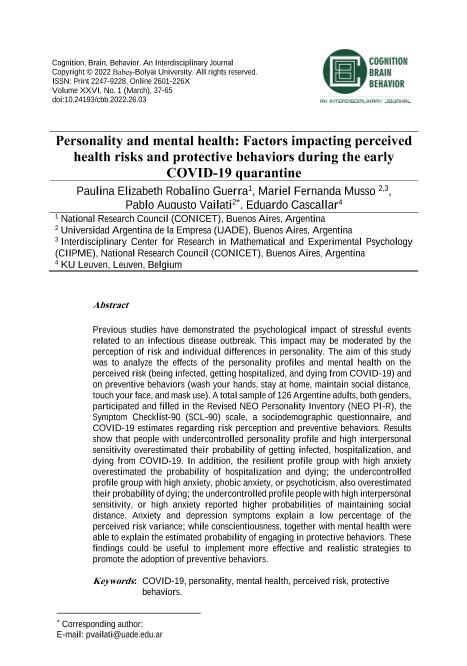Artículo
Modeling the Contribution of Genetic Variation to Cognitive Gains Following Training with a Machine Learning Approach
Fecha de publicación:
03/2022
Editorial:
John Wiley & Sons
Revista:
Mind, Brain, and Education
e-ISSN:
1751-228X
Idioma:
Inglés
Tipo de recurso:
Artículo publicado
Clasificación temática:
Resumen
Previous studies have demonstrated the psychological impact of stressful events related to an infectious disease outbreak. This impact may be moderated by the perception of risk and individual differences in personality. The aim of this study was to analyze the effects of the personality profiles and mental health on the perceived risk (being infected, getting hospitalized, and dying from COVID-19) and on preventive behaviors (wash your hands, stay at home, maintain social distance, touch your face, and mask use). A total sample of 126 Argentine adults, both genders, participated and filled in the Revised NEO Personality Inventory (NEO PI-R), the Symptom Checklist-90 (SCL-90) scale, a sociodemographic questionnaire, and COVID-19 estimates regarding risk perception and preventive behaviors. Results show that people with undercontrolled personality profile and high interpersonal sensitivity overestimated their probability of getting infected, hospitalization, and dying from COVID-19. In addition, the resilient profile group with high anxiety overestimated the probability of hospitalization and dying; the undercontrolled profile group with high anxiety, phobic anxiety, or psychoticism, also overestimated their probability of dying; the undercontrolled profile people with high interpersonal sensitivity, or high anxiety reported higher probabilities of maintaining social distance. Anxiety and depression symptoms explain a low percentage of the perceived risk variance; while conscientiousness, together with mental health were able to explain the estimated probability of engaging in protective behaviors. These findings could be useful to implement more effective and realistic strategies to promote the adoption of preventive behaviors.
Palabras clave:
COGNITIVE GAINS
,
MACHINE LEARNING
,
GENETIC VARIATION
,
PREDICTION
Archivos asociados
Licencia
Identificadores
Colecciones
Articulos(CIIPME)
Articulos de CENTRO INTER. DE INV. EN PSICOLOGIA MATEMATICA Y EXP. "DR. HORACIO J.A RIMOLDI"
Articulos de CENTRO INTER. DE INV. EN PSICOLOGIA MATEMATICA Y EXP. "DR. HORACIO J.A RIMOLDI"
Citación
Musso, Mariel Fernanda; Cómbita, Lina M.; Cascallar, Eduardo C.; Rueda, M. Rosario; Modeling the Contribution of Genetic Variation to Cognitive Gains Following Training with a Machine Learning Approach; John Wiley & Sons; Mind, Brain, and Education; 16; 4; 3-2022; 300-317
Compartir
Altmétricas




